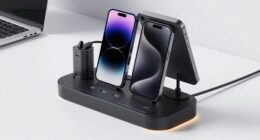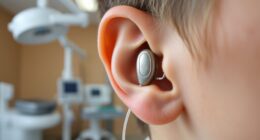If you have diabetes, you’re more likely to experience hearing loss because high blood sugar damages tiny blood vessels and nerves in your ears, reducing circulation and affecting nerve signals. This can lead to gradual hearing difficulties and balance issues. Good blood sugar control can help protect your hearing over time. To understand how managing your diabetes and recognizing early symptoms can make a difference, keep exploring this important connection.
Key Takeaways
- Diabetes damages small blood vessels in the ear, impairing circulation and risking hearing loss.
- High blood sugar levels can harm inner ear nerves, leading to nerve damage and auditory processing issues.
- Proper blood sugar control reduces the risk of tinnitus and progressive hearing deterioration.
- Early symptoms like ringing or muffled sounds indicate potential hearing problems linked to diabetes.
- Managing diabetes through diet, exercise, and medical care helps prevent or slow hearing loss progression.
How Diabetes Affects the Ear’s Microvasculature
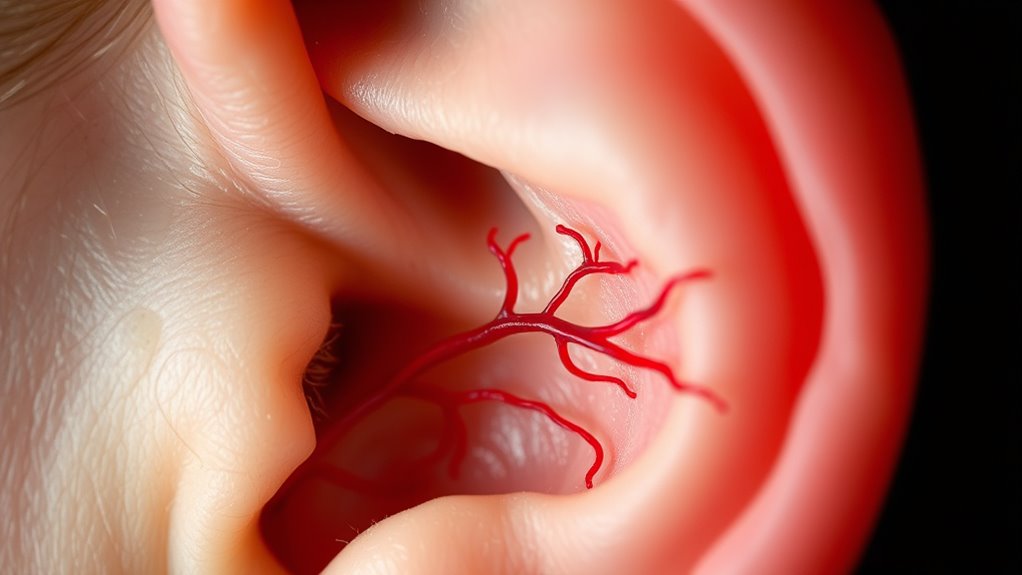
Diabetes can markedly impair the microvasculature in your ears, leading to reduced blood flow and nutrient delivery to critical structures. This disruption affects the inner ear circulation, which is essential for maintaining hearing function. When microvascular complications develop, tiny blood vessels become damaged or narrowed, restricting oxygen and essential nutrients to the cochlea and other inner ear components. Over time, this diminished circulation can cause tissue damage, impair cellular repair, and increase susceptibility to hearing issues. You might notice subtle changes in your hearing or balance as these microvascular issues progress. Managing blood sugar levels and addressing microvascular health is imperative, as maintaining healthy microvasculature helps preserve the inner ear’s structure and function, reducing the risk of hearing loss linked to diabetes.
The Role of Nerve Damage in Hearing Loss
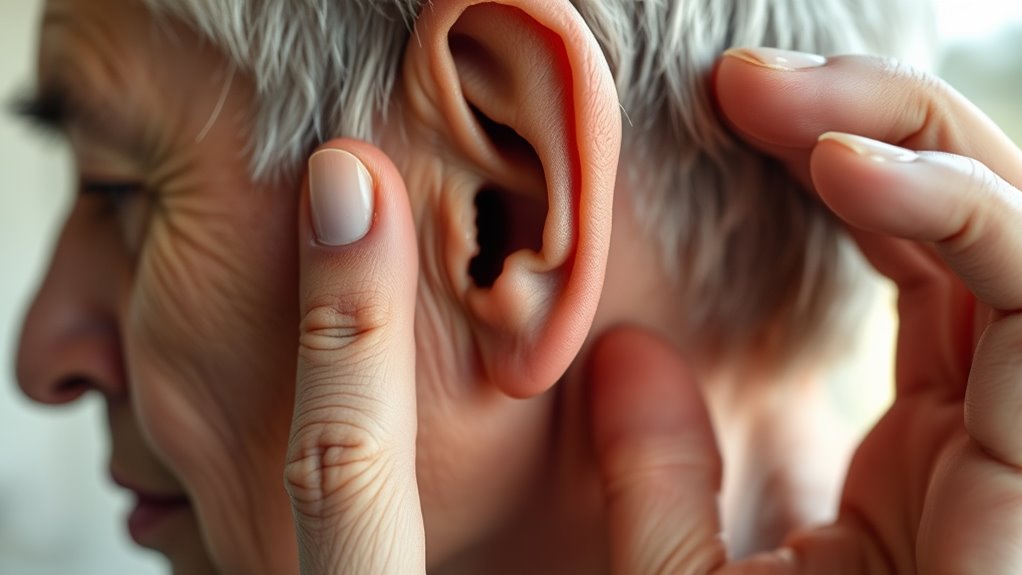
Nerve damage plays a crucial role in hearing loss among diabetes patients by disrupting the transmission of sound signals from the inner ear to the brain. When the inner ear nerves are damaged, your auditory system can’t efficiently send signals, leading to hearing difficulties. This condition, known as auditory neuropathy, occurs when the nerves responsible for transmitting sound information are compromised. Diabetes can cause nerve damage through high blood sugar levels, which harm the delicate inner ear nerves. As a result, even if your ears detect sounds normally, your brain may not receive clear signals. Damage to the auditory nerves can also be worsened by nerve degeneration, further impacting hearing health. This nerve damage can cause a range of hearing issues, from mild difficulty to severe loss. Protecting your nerves is essential to maintaining better hearing health.
Evidence Linking Blood Sugar Control and Hearing Health

Research shows that maintaining good blood sugar control can substantially impact your hearing health. When blood sugar levels are stable, you’re less likely to experience issues like tinnitus or progressive hearing loss. Studies have shown that poor blood sugar management increases the risk of nerve damage in the ears, making hearing aids a valuable option for some. Controlling your blood sugar can also reduce the severity of diabetes and tinnitus symptoms, helping you stay connected and engaged. AI safety measures are crucial to ensure the reliability of health-related AI tools that can assist in managing conditions like hearing loss.
Recognizing Symptoms and When to Seek Help

Maintaining good blood sugar levels not only supports overall health but also plays a key role in preventing or delaying hearing problems. Being aware of symptoms is essential; if you notice ringing, muffled sounds, or difficulty hearing, don’t ignore these signs. Changes in dietary habits, such as reduced sugar intake, can improve blood sugar control and potentially protect your hearing. Lifestyle modifications like avoiding loud noises and managing stress also help preserve hearing health. Seek help promptly if you experience persistent hearing issues, dizziness, or ear discomfort. Early intervention can prevent further damage and improve outcomes. Recognizing affairs – cheating husband secrets, early symptoms, and making informed lifestyle changes are vital steps in safeguarding your hearing while managing diabetes effectively.
Strategies for Prevention and Management
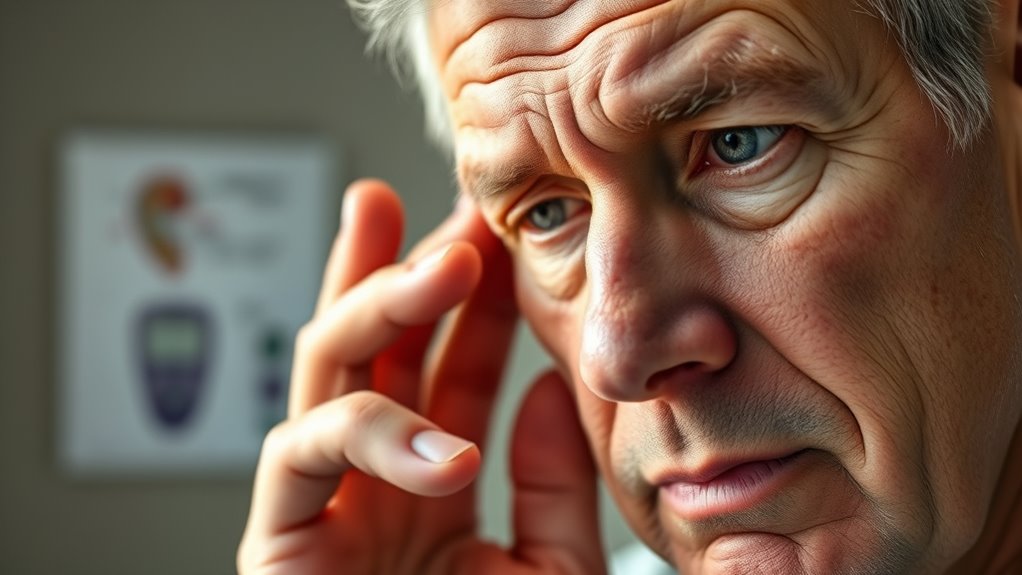
Implementing practical strategies can substantially reduce the risk of hearing loss in people with diabetes. You can do this by making simple lifestyle changes. Focus on dietary adjustments, like reducing sugar intake and eating nutrient-rich foods that support overall health. Incorporate regular exercise routines to improve blood circulation and help control blood sugar levels. Additionally, consider these actions:
- Maintain a balanced diet with fruits, vegetables, and lean proteins
- Engage in aerobic exercises, like walking or cycling, at least 3-4 times a week
- Avoid smoking and excessive alcohol, which can worsen hearing health
These strategies help manage diabetes effectively and protect your hearing. Staying proactive with your health can make a significant difference in preventing hearing loss and maintaining overall well-being.
Frequently Asked Questions
Can Hearing Loss Be Reversed in Diabetes Patients?
Hearing loss in diabetes patients often can’t be fully reversed, but treatment options like hearing aids and cochlear implants can markedly improve your hearing. Managing your blood sugar levels may slow further damage, but once nerve or hair cell damage occurs, reversing it is unlikely. Regular check-ups and early intervention with hearing devices help you maintain better communication and quality of life, even if the loss isn’t entirely reversible.
Are Certain Types of Diabetes More Prone to Hearing Issues?
You might notice that certain types of diabetes, like type 2, are more prone to hearing issues. This is because higher blood sugar levels can lead to diabetic neuropathy, damaging nerves involved in hearing. Managing your blood sugar effectively helps reduce the risk. So, if you keep your blood sugar under control, you can lower your chances of developing hearing problems linked to diabetic nerve damage.
How Early Can Hearing Damage Be Detected in Diabetics?
Ever wonder how early you can catch hearing damage? The answer varies, but hearing screening and auditory testing can detect issues as early as your symptoms appear. Regular checkups are crucial, especially if you have diabetes, since early detection helps prevent further loss. Don’t wait until you notice a problem—schedule routine auditory testing to keep your hearing sharp and catch any damage early.
Do Diabetes Medications Impact Hearing Health?
You might wonder if diabetes medications impact hearing health. Generally, most medications don’t directly cause hearing loss, but some medication side effects could influence ear health. If you experience hearing issues, consult your doctor about your options, including hearing aid options. They can help determine whether your medication might be affecting your hearing and suggest adjustments or additional treatments to support your hearing health effectively.
Is Hearing Loss More Common in Type 1 or Type 2 Diabetes?
Imagine your ears as delicate gardens, vulnerable to the weeds of health issues. You might wonder if hearing loss blooms more in type 1 or type 2 diabetes. Research suggests hearing loss is more common in type 2, often linked to poor diabetes management. Regular hearing assessments can catch early signs, helping you protect your auditory garden. Stay vigilant, manage your diabetes well, and listen to your body’s signals.
Conclusion
Now that you know how diabetes can impact your hearing, it’s clear you shouldn’t ignore the signs. Taking control of your blood sugar levels and staying vigilant can help you catch problems early—better safe than sorry. Remember, an ounce of prevention is worth a pound of cure. Stay proactive with regular check-ups and listen to your body; your ears will thank you for it, and you’ll keep the music playing longer.








